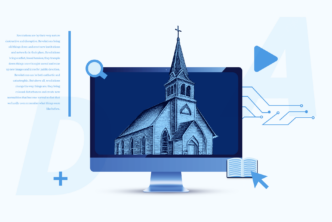By Jeff Reed
Back in my early days of ministry, I served at a church that had just hired a new creative director. To some at this church, the idea of a creative director was foreign, and the gossip behind closed doors was that he was becoming the “pastor of Photoshop.” Years later, we can laugh at that church’s lack of vision. Today, it’s obvious to most if not all that ministries need a creative director of some sort. But back in the day? Very controversial.
Similarly, the online pastor has gone through difficulties with vision. Who are these people shepherding? Who are they counseling? Can you even disciple in online spaces? In recent years, I was introduced to a church staff as the “online pastor,” and another pastor stood up and asked, “Are we, as a church, theologically OK with doing this?” (Utilizing online communication technology to create disciples? Why wouldn’t you be!)
But what does an online pastor do? I get asked this a lot. Here’s a job profile to help start the conversation.
1. Develop the weekend for online
Work alongside worship, production, and stage teams in preparing your weekly service online. Most weekend prep teams understand how to create effective worship services in physical spaces. They don’t yet understand how to do it online. Help them see.
Do the announcements work for people outside of your physical locations? Does the application of the message need adjusting for people watching from an online environment? An effective online pastor helps others understand how to reach an online audience.
2. Drive online discipleship
Just like our physical churches, our church online is called to do more than weekend services. An online pastor should be more like a small groups pastor than anything else. The most important thing an online pastor can do is discover, meet, and engage the people who are watching online. Get them connected to your online discipleship pathway. Don’t have a pathway set up for online yet? Figure out what your church does at its physical locations and port it online. An effective online pastor will relationally connect with people, preventing church-in-isolation (“attending” but never knowing anyone).
3. Champion online locations
Battling the church-in-isolation ideology that can ail church online, an online pastor should constantly challenge attenders to make physical connections (as well as virtual connections). Empower others to start watch parties, microsites, house churches—whatever you want to call them—because healthy church online isn’t just a virtual broadcast watched on an iPhone but a method of gathering people in physical spaces. An effective online pastor will accept the opportunities to disciple and train leaders of these smaller locations.
4. Research and pivot
Online experiences change on a regular basis. Church online should, too! What is the church doing that’s working? What’s not working? What new advances are happening in technology? Is the technology the end, or is it the means to the end? Remember, methods may change, but the message remains the same! Ask questions like:
- Since online is a different medium than in person, what content can we create to be a more effective front door?
- In what ways can mobile technology help us make disciples 168 hours a week, not just for one hour on Sundays?
- How can our technology help people serve in their community, wherever they are?
5. Empower all staff
In the free-flowing world of church during COVID-19, the online pastor is more critical now than ever. Because most attenders now engage both digitally and physically, and because the online pastor can’t possibly pastor the whole church, he or she increasingly exists to help other staff develop a robust online ministry. The online pastor is essentially a rah-rah cheerleader making sure everyone manages their online responsibilities well.
If you want to be effective in doing church online, it’s time to start staffing online. Find someone who is first and foremost a pastor, and second, who looks at the above responsibilities and says, “Bring it on.”
***
This post was originally published in the November issue of Ministry Team magazine.
Jeff Reed is the director of digital church planting at Stadia Church Planting. As passionate about discipleship as he is about technology, Jeff helps churches develop technology systems to bring people closer to God.





